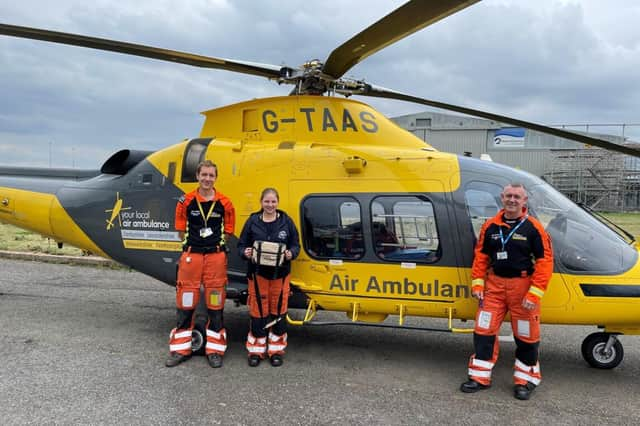Air Ambulance in Warwickshire will now be able to provide prehospital emergency blood transfusions to those patients who have life-threatening injuries


The Air Ambulance service in Warwickshire will now be able help more people with blood transfusions through the addition of blood and plasma on board its helicopters and critical care cars.
Every day, The Air Ambulance Service – which operates the Warwickshire and Northamptonshire Air Ambulance (WNAA) and Derbyshire, Leicestershire and Rutland Air Ambulance (DLRAA) – attends victims of major trauma some of which suffer catastrophic bleeding.
Advertisement
Hide AdAdvertisement
Hide AdThis latest clinical development for the service allows its medical crews to provide prehospital emergency blood transfusions to those patients who have life-threatening bleeding from medical conditions to severe injuries - predominately sustained through road traffic collisions or stabbings.
With road traffic collisions making up most of the incidents TAAS has attended over the past 19 years, and with the increase of knife crime throughout its counties, this onboarding of blood and plasma further enhances the vital care provided to the service’s patients.
“For the bleeding patient, blood transfusion is one part of a package of critical care that is provided by our teams to bring advanced resuscitation earlier in the patient’s care before they arrive at hospital, giving them the best chance of survival,” explained The Air Ambulance Service deputy clinical lead and University Hospital Coventry and Warwickshire (UHCW) consultant Dr Caroline Leech.
“With data from UHCW showing that two thirds of their major trauma patients who required emergency blood transfusion were treated and transported by TAAS, it has shown there may be a potential benefit in bringing blood to the patient earlier.
Advertisement
Hide AdAdvertisement
Hide Ad"All our doctors and critical care paramedics have received comprehensive training alongside enhanced procedures to be able to deliver the intervention efficiently at scene,” added Caroline.
The project has taken 18 months to come to fruition and is a collaboration between University Hospital Coventry & Warwickshire NHS Trust blood transfusion laboratory, Nottingham University Hospital blood transfusion laboratory, the Warwickshire and Solihull Blood Bikes, and Leicestershire and Rutland Blood Bikes.
NUH Charity, Nottingham University Hospitals have also given a grant to help the charity fund a blood fridge and blood plasma freezer at their hospital site.
“We are extremely pleased to have funded this blood fridge and blood plasma freezer to enable the storage of vital blood products for patients being treated by The Air Ambulance Service,” said Barbara Cathcart, chief executive of Nottingham Hospitals Charity.
Advertisement
Hide AdAdvertisement
Hide Ad“We hope that this will enable patients suffering from heavy blood loss to be treated as soon as possible, before their arrival at hospital, giving them the best possible chance of recovery.
"This donation was made possible thanks to our generous donors from across the Midlands.”
Both WNAA and DLRAA will be carrying packed O negative red blood cells (pRBC) which carry oxygen around the body, and Fresh Frozen Plasma (FFP) which contains clotting factors that help to make a blood clot and stop bleeding.
There will be a 24-hour rotation of blood products, and any blood and plasma that is not used by the air ambulance will be put back into the blood bank and can be administered to patients in hospital thereby avoiding any wastage.